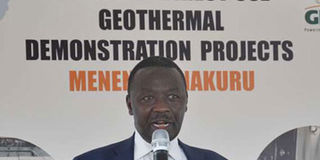Energy initiative vital for future progress

Ministry of Energy and Petroleum Principal Secretary Joseph Njoroge at a past event. Kenya chose to participate in the Sustainable Energy for All (SE4All) process in 2012. A mission hosted by the Ministry of Energy and Petroleum concluded that there was a strong base for launching an ambitious scale-up energy programme in the country. PHOTO | COURTESY
What you need to know:
- Kenya is one of the pioneer countries in Africa to choose the SE4All process, which was launched by the UN Secretary-General in 2011.
- The global initiative focuses on three goals: ensuring universal energy access, doubling the share of renewable energy in the global energy mix, and doubling the rate of improvement in energy efficiency.
- The most recent technical committee meeting provided stakeholders with an opportunity to identify priority action areas and gaps in the reviewed AA and IP.
Developing countries have as much responsibility as their developed counterparts in ensuring the success of the Sustainable Energy for All (SE4All) initiative.
Kenya is one of the pioneer countries in Africa to choose the SE4All process, which was launched by the UN Secretary-General in 2011.
The global initiative focuses on three goals: ensuring universal energy access, doubling the share of renewable energy in the global energy mix, and doubling the rate of improvement in energy efficiency.
The initiative is aligned with Kenya’s Vision 2030, which identifies energy as a key enabler for development.
In addition, Kenya’s energy policy environment is progressively evolving to increasingly promote an affordable, sustainable, and reliable energy to meet the country’s development needs.
Kenya chose to participate in the SE4All process in 2012. A mission hosted by the Ministry of Energy and Petroleum concluded that there was a strong base for launching an ambitious scale-up energy programme in the country.
DEVELOP ACTION PLANS
A report capturing a stock-taking exercise and gap analysis of Kenya’s energy sector was conducted by the ministry.
Guidelines for developing action agendas in African countries were developed through a process coordinated by the Nepad Energy Agency and approved by the African Union.
For the sake of harmonisation, the Africa SE4All Coordination Hub was established to assist African countries to develop their respective action plans (AA) and investment prospectuses (IP). Kenya’s AA and IP will guide the implementation of the SE4All initiative in the country.
Additional support from the SE4All Africa coordination hub has been given to update the Kenyan AA/IP in line with the recommendations of a multi-stakeholder forum. Complementary support has been received from various partners.
The Kenya SE4All process has been consultative under the coordination of the Ministry of Energy and Petroleum.
The technical team has guided stakeholder engagement encompassing a wide range of participants from government, private sector, civil society organisations, and development partners, who are also members of the bigger technical committee.
DEVELOPMENT GOALS
The most recent technical committee meeting provided stakeholders with an opportunity to identify priority action areas and gaps in the reviewed AA and IP. This was followed by a SE4All awareness creation campaign at the county last August.
A formal structure for coordinating implementation, monitoring, and evaluation of high-priority actions, programmes, and projects will be embedded into the final AA and IP.
These documents will help Kenya to attract investment in high-priority actions and projects, contributing towards the country’s development goals.
Improving access to efficient, renewable energy sources and delivery mechanisms, will help reduce reliance on biomass.
This will contribute towards efforts in climate change adaptation and help mitigate its effects, conserve the environment, reduce the risk of indoor air pollution, especially in rural areas, ensure provision of reliable communal services such as health and education, and sustain the gains made in rural development.




